Search
 News
News
Renowned Expert to Lead UCSF’s Hematology and Oncology Division
Krishna Komanduri, MD, an international leader in hematology-oncology, transplantation and cellular immunotherapy, is the new chief of UCSF’s Division of Hematology and Oncology. News
News
UCSF Prostate Cancer Specialist Inducted into Annual Class of “Giants of Cancer Care”
Eric Small, MD, has been announced as one of the winners of the 10th annual Giants of Cancer Care® awards. News
News
Advancing Precision Medicine for Neuro-Oncology Patients: Q&A with David Solomon, MD, PhD
UC San Francisco neuropathologist and molecular neuro-oncologist David Solomon, MD, PhD has reached a unique and impressive milestone: the publication of his team's 50th neuro-oncology research study stemming from the UCSF500 Cancer Gene Panel, a molecular diagnostic test that identifies genetic changes in the DNA of a patient's cancer. News
News
UCSF Deploys Innovative Data System to Integrate Research and Care
UC San Francisco (UCSF), in collaboration with the Quantum Leap Healthcare Collaborative (QLHC) and the U.S. Food and Drug Administration (FDA) has developed the OneSource system to seamlessly integrate clinical care and research data. News
News
Bladder Cancer Home Test Reduced Need for Cystoscopy During COVID-19
A study led by UCSF urologic cancer surgeons Sima Porten, MD, MPH, and Maxwell Meng, MD, found that use of a home urine test during the COVID-19 pandemic decreased the frequency of surveillance cystoscopy for patients with a history of non-muscle invasive bladder cancer (NMIBC).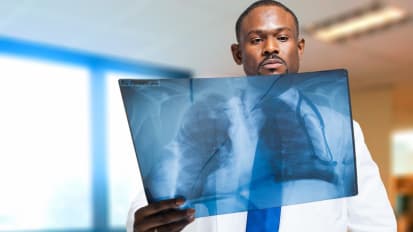 Video
Video
Lung Cancer Screening: Who, How and When to Refer
†horacic radiologist Brett M. Elicker, MD, and thoracic surgeon Johannes Kratz, MD, present about current lung cancer screening guidelines: who, how, and when to refer. News
News
Immune Cells Leave Fingerprints on Tumors Metastasized to the Brain Offering Clues to Future Therapies
Using data from over 100,000 malignant and non-malignant cells from 15 human brain metastases, UCSF researchers have revealed two functional archetypes of metastatic cells across 7 different types of brain tumors, each containing both immune and non-immune cell types. Their findings, published the February 17 issue of CELL, provide a potential roadmap for metastatic tumor formation that could be used to design therapies to improve the treatment of metastasized patients. News
News
Pancreatic Cancer Patient Exceeds Life Expectancy After Complex Whipple Procedure at UCSF
A team of UCSF surgeons devised a successful reconstruction approach during a complex Whipple procedure in a 69-year-old man with locally advanced pancreatic adenocarcinoma. News
News
Sorting Cancers by “Immune Archetypes” Represents Potential New Approach to Developing Precision Immunotherapies
Using data from over 300 patient tumors, UCSF researchers have described 12 classes of “immune archetypes” to classify cancer tumors. Their findings, published today in CELL, reveal that cancers from different parts of the body are immunologically similar to one another. These classifications provide unique strategies for enhancing each patient’s choice of cancer immunotherapies. News
News
UCSF Study Finds 25% of Patients with HPV+ Oropharynx Cancer May Require Chemoradiotherapy After Robotic Surgery
In a nearly 10-year retrospective study involving 136 carefully selected patients with HPV-positive (HPV+) oropharynx cancer, UC San Francisco researchers found that one in four may meet possible indications for adjuvant chemoradiotherapy following transoral robotic surgery (TORS). Video
Video
UCSF Osher Center Overview: Integrative Medicine’s Value for Providers and Patients
Sanford C. Newmark, MD, medical director of the UCSF Osher Center for Integrative Medicine, explains what integrative medicine is (hint: it’s neither “alternative medicine” nor homeopathy) and how referred patients can benefit from its proven techniques.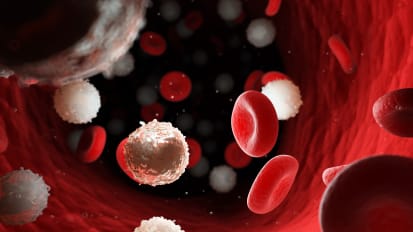 News
News
International Hematologic Conference Features UCSF Health Experts
Hematologists and oncologists from around the world will present new research and clinical findings at the American Society of Hematology’s (ASH) 63rd Annual Meeting and Exposition. This year’s meeting will be held in Atlanta, Georgia – and virtually – from December 11-14, 2021. News
News
International Breast Cancer Conference Features UCSF Health Experts
Breast cancer experts from UCSF Health will present new research and clinical findings at the annual San Antonio Breast Cancer Symposium, the world’s largest and most prestigious breast cancer conference. This year’s meeting will be held Dec. 7-10. Video
Video
Screening for Cervical Cancer: New Evidence on Options and Outcomes
Gynecologic oncologist Megan Swanson, MD, MPH, deciphers recent changes to cervical cancer screening guidelines and uses the data to illuminate the relative value of test options – Pap smears, detection of high-risk HPV strains, or both tests together.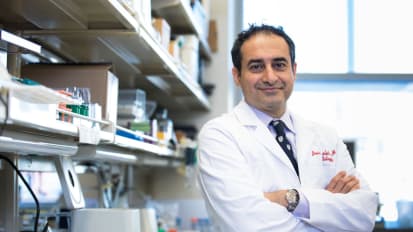 News
News
UCSF-Led Study Confirms Some Cancer Immunotherapies May Lead to Myocarditis and Other Potentially Serious Arrhythmias
Immune checkpoint inhibitors (ICIs) have transformed cancer care by unleashing T-cells to fight tumors, but they can cause serious cardiotoxicities including myocarditis. Video
Video
Get Current on COVID: The Evidence on Vaccine Efficacy and Strategies for Immunocompromised Patients
A panel of experts answers all the current questions on breakthrough infections, who needs boosters, whether to keep recommending masks, and the future of variants, with a spotlight on meeting the needs of the immunocompromised, such as organ transplant recipients and cancer patients. Bonus: what to know about molnupiravir to treat COVID-19.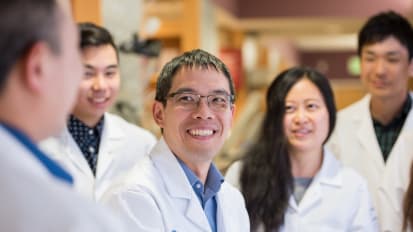 News
News
UCSF’s Lawrence Fong, MD, Earns NCI Award for Cancer Immunotherapy Research
The National Cancer Institute (NCI)has honored Lawrence H. Fong, MD, leader of the UC San Francisco Cancer Immunotherapy Program, with an Outstanding Investigator Award (R35).These awards support investigators who have significant records of productivity in cancer research with multiyear funding for projects of exceptional potential.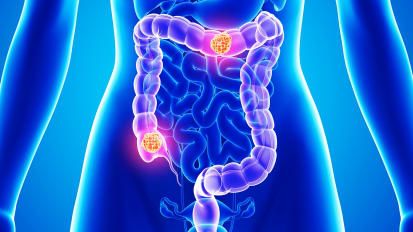 News
News
An Extraordinary Response: A Young Woman’s Path to Overcoming Metastatic Colon Cancer
28-year-old woman mother of two was healthy up until a month prior, when she developed severe anemia, diarrhea and emesis, accompanied by a 25-pound weight loss. Document
Document
UCSF500 Cancer Gene Panel Test
The UCSF500 Cancer Gene Panel leverages world-class expertise for advanced cancer cases. Designed by our leading cancer specialists, the UCSF500 offers unparalleled depth and precision in genetic analysis. Video
Video
Proven, Practical Prevention: Lower Your Patients’ Cancer Risks – and Anxiety
In this second part of her series on lifestyle and cancer, medical oncologist Natalie Marshall, MD, offers evidence-based answers to common questions on diet, sleep, and other risk-related factors. News
News
UCSF at the Forefront of New Therapies, Giving Hope to Multiple Myeloma Patients
Over the past few decades, advances in the treatment of multiple myeloma (MM) have accelerated at a thrilling pace, with a wealth of new therapeutic options now available for patients with this serious disease.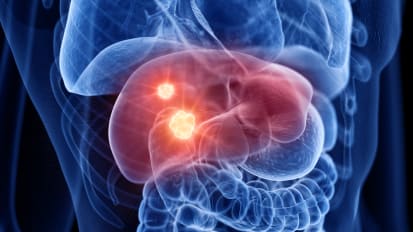 News
News
Advances in Treating Colorectal Cancer With Liver Metastases
Giving new hope to potentially thousands of patients, surgeons at UC San Francisco are now providing lifesaving procedures for many colorectal cancer patients whose cancer has spread to the liver. News
News
UCSF Clinic Fills Unmet Need for Managing Oral Side Effects of Cancer Therapies
As advances in cancer treatments have expanded, so has the number of side effects that impact the mouth. Oral medicine specialists at UC San Francisco are working to mitigate these often-debilitating problems, which affect the majority of patients undergoing or recovering from cancer therapy. Document
Document
UCSF Oral Oncology
The UCSF Oral Oncology Clinic offers consultations for the diagnosis, treatment and management of oral complications from cancer treatment. The clinic is the first and only one of its kind in Northern California.

